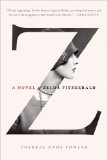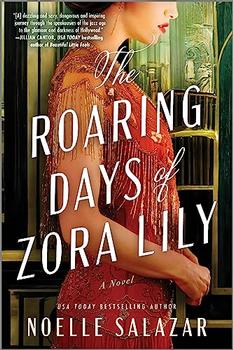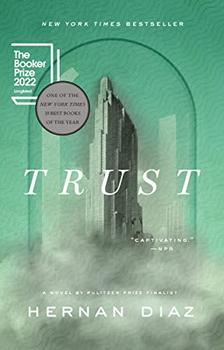Summary | Excerpt | Reading Guide | Discuss | Reviews | Beyond the book | Read-Alikes | Genres & Themes | Author Bio

When it comes to American literature's golden "it" couple, it was hard to tell if life imitated art or if it was the other way around. Scott Fitzgerald once said, "Sometimes, I don't know whether Zelda and I are real or whether we are characters from one of my own novels." The glamorous power couple that captured the public's imagination in the Jazz Age occupies center stage in Therese Ann Fowler's new book, simply called Z. Zelda narrates the heartbreaking love story, and while this is fiction, much of it stays true to the Fitzgeralds' real-life trajectory from a young couple madly in love, to their excesses, and eventual falls.
Many who pick up the book might be familiar with – or partial to – one or the other Fitzgerald. In the afterword, the author mentions that both Scott and Zelda had reputations as being the other's muse but were also the reason for their downfall. While I was vaguely familiar with Scott Fitzgerald's life (I still envision him as the flamboyant Jay Gatsby), I knew practically nothing about Zelda; so it was fun to first meet her as a whip-smart young adult, barely 18. As the book opens in 1918, Zelda, the daughter of one of the Supreme Court Justices of Alabama, is already chafing at established norms in Montgomery. While the rest of her sisters grow up and follow tried-and-tested paths, picking local boys to marry, and eventually resigning to lives as wives and mothers, Zelda has other plans. When a Yankee boy, serving in the Armed Forces and posted on a local assignment, asks her to dance, she is intrigued. Slowly, she falls in love with the handsome Scott Fitzgerald of St. Paul, Minnesota. Scott is sure of his plans – he wants to become a writer. Zelda's father is not so sure about her alliance with a suspicious Yankee, especially one on an unsteady writer's income. But Zelda and Scott are so madly in love that they simply can't be denied.
Eventually the two are married and Scott slowly starts to earn money selling stories, trying to give Zelda the life of a princess that he is sure she deserves. They live way beyond their means though, with Scott not knowing how to keep things on a budget and Zelda too scared or cocooned to care. Their high-flying life brings them attention and more fame, and Scott understands that, at some level, it is its own kind of marketing and helps sell stories. Their jet-setting lifestyle (they live in New York, the Riviera, and in Paris for a long time) cannot be sustained indefinitely and soon Scott's weaknesses for drink and glamor start fraying the fabric of their marriage. Throw in a child; Zelda's increasing desire for an independent career of her own; mix it all with Scott's increasing insecurities and you've got a recipe for disaster. The situation is made a lot worse by the addition of Ernest Hemingway, whom Zelda is very wary of (yet Scott worships, at least at the beginning). "I just can't imagine what the appeal is; they're about as alike as parsnips and pachyderms," Zelda says about them. Things finally go careening over the edge when Scott's drinking problem gets out of control and Zelda falls seriously ill with bipolar disorder (she's initially diagnosed as having schizophrenia).
I absolutely loved Therese Ann Fowler's charting of the Fitzgeralds' relationship – the fairy-tale young love, the giddy first years of marriage, the gradual disillusionments piled richly one on top of the other, and the eventual complete unraveling of the relationship. It's deeply tragic because both Scott and Zelda are so deeply talented yet so fundamentally flawed. Right until the end, you can sense their deep and abiding love of one another even as they become increasingly toxic for each other.
As I was reading Z, I was reminded of my mother-in-law, who after years of catering to her husband's every whim, said out loud once "In my next life, I want to be born a man." Zelda's marriage is set against the backdrop of the early rise of the women's rights movement and her struggle between what she is expected to do as a wife and what she must do for her own self is a thing of beauty to behold. When she writes to her mother about her conflicts, her mother replies: "We are not entitled to assert them over our husband's priorities and wishes. Perhaps if you will accept this, your health will improve and subsequently so will your happiness." This only serves to stoke the fire more. "Part of me chafed against Mama's old-fashioned attitudes. These were modern times, and women were more than chattel. Part of me worried that she was right; maybe I would be happier if I accepted the traditional thinking, rejected this particular aspect of the modern woman's approach to marriage," Zelda says. " It was so much easier to be led, to be pampered and powdered and petted for being an agreeable wife. Easier, I thought, but boring. And not only boring, but plain wrong." Time and time again Zelda chooses to play second fiddle to Scott, sacrificing her dreams of a career in the arts in favor of her husband's. When she publishes stories, she agrees to Scott's byline being added to hers (they will sell better, she is assured). When she is offered a position as a professional ballet dancer, Scott complains it will ruin his career. Despite these obvious pitfalls, neither does Scott come across as a total uncompromising boor nor does Zelda seem like a pushover. You can see them working at the relationship, trying (and failing) to get at least a few things right.
Marriage, love, our ever-evolving roles even over the span of a marriage – these are timeless themes. One wonders how things might have been different for Zelda if she had been born in contemporary times. Would she have found it better to just leave Scott? Would her definition of marriage and a woman's role in it be fundamentally altered? It is hard to say. For all you know, the frame of reference for the dialog might have shifted a little but its essential arguments might have stayed the same. As this beautiful novel shows us, love is all you need. Until, well, it isn't.
Additional Information
Movie lovers might find much to love in Woody Allen's "Midnight in Paris," which is set in this era. The "Fitzgeralds" make an appearance in this memorable scene with actor Owen Wilson:
![]() This review was originally published in The BookBrowse Review in April 2013, and has been updated for the
March 2014 edition.
Click here to go to this issue.
This review was originally published in The BookBrowse Review in April 2013, and has been updated for the
March 2014 edition.
Click here to go to this issue.

If you liked Z: A Novel of Zelda Fitzgerald, try these:

by Noelle Salazar
Published 2023
The discovery of a hidden label on a famous gown unearths the story of a talented young seamstress in this glittering novel of family, love, ambition, and self discovery by the USA Today bestselling author of The Flight Girls.

by Hernan Diaz
Published 2023
An unparalleled novel about money, power, intimacy, and perception.
A classic is a book that has never finished saying what it has to say
Click Here to find out who said this, as well as discovering other famous literary quotes!
Your guide toexceptional books
BookBrowse seeks out and recommends the best in contemporary fiction and nonfiction—books that not only engage and entertain but also deepen our understanding of ourselves and the world around us.